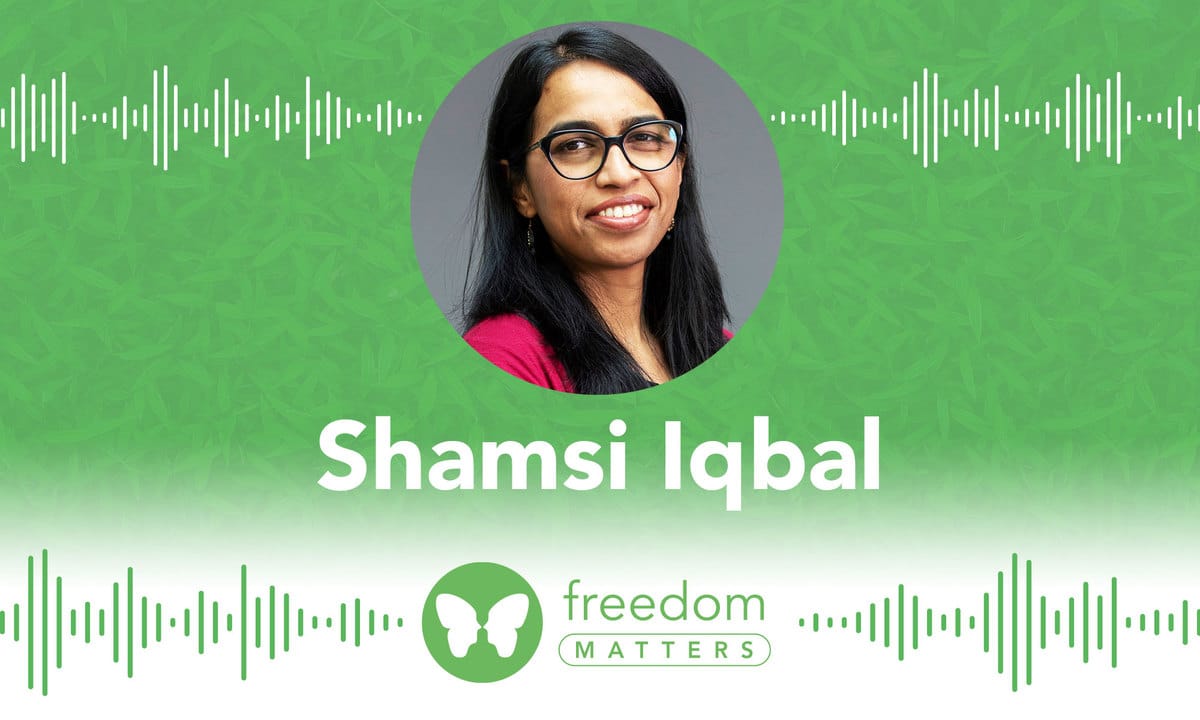Ranjay Gulati – Purpose is the Heart & Soul of High Performance Companies

The Harvard Business Professor explains why cultivating purpose brings meaning, fulfillment & success.
At Freedom, our goal is to educate, inspire, and provide everything you need to do your best work. Because of that, we’re constantly thinking about the past, present –and most of all the future– of work and how we can help shape the world of work around our happiness and wellbeing.
Over the past couple of years, the pandemic has transformed the way we work, as well as our attitudes towards it. Most people are considering their jobs with a fresh perspective. Some are quitting, in what has been dubbed the Great Resignation. But, as Ranjay Gulati puts it, for many, it’s more of a Great Rethink.
Do we really like our employers’ culture? Do we feel that we’re fairly treated and have the advancement opportunities we want? Most profoundly, does our work feels as meaningful as we’d like it to? It is these questions that the Harvard Business School professor addresses in his latest book, Deep Purpose.

Meet Ranjay Gulati
Ranjay Gulati is an expert on leadership, strategy, and organizational growth. Until recently, he chaired the Advanced Management Program, Harvard Business School’s flagship senior leader executive program. He has authored seven books and his latest, Deep Purpose: The Heart and Soul of High-Performance Companies, was released in February 2022.
Gulati’s recent work explores organizations and management in three key ways. First, he examines the many challenges organizations face when seeking to grow rapidly in turbulent markets. Second, he has examined how important it is for leaders to build resilient organizations that can scale quickly while also retaining the culture and energy necessary for innovation. Finally, he has studied the skills and behaviors leaders need to steer fast-moving organizations.
While scholars have traditionally emphasized the motivational and inspirational qualities of great leaders, Gulati has argued that leaders today must cultivate courage in others, activating a winning mindset centered around priorities, principles, and purpose.
Leaders today must cultivate courage in others, activating a winning mindset centered around priorities, principles, and purpose.
Here at Freedom, we are always so inspired by leaders who practice what they preach, and Ranjay is certainly no exception! Despite an extremely busy schedule, he was able to take the time to talk more about the work and ideas behind Deep Purpose and explain how we can all cultivate a greater sense of purpose while encouraging those around us to do the same.
We are sure you come away feeling just as motivated as we did after reading this!
What inspired you to write Deep Purpose?
There were several influences. One was my mother, who in the 1970s started making Indian garments and selling them to Western customers. She enlisted the help of rural Indian villagers to make the clothes. By building a profitable business that provided valuable goods to customers and at once also improved the standard of living of her village suppliers, she infused her business with a larger purpose.
Another influence was the Boston Marathon bombing, which moved many business leaders to launch fundraising efforts for the victims. This was certainly a good thing, but it caused my Advanced Management Program students at Harvard to wonder why purpose, especially one that encompasses serving your communities, seems to shine brightest in times of crisis. Why, they asked, can’t it be woven into the way companies conduct their daily business?
Another motivation was my research into fast-growth startups, which often reach a point wherein the words of many founds, they seem to lose their soul – or the deeper reason they decided to form in the first place. I wanted to see if there was a way to prevent that from happening.
People are reconsidering the entire direction of their lives, yearning to integrate their work life and their personal purpose.
You’ve talked about how The Great Resignation is actually more of a Great Rethink. What do you mean by this?
As many articles and opinion pieces have noted, the pandemic led to an increase in resignations, with people moving to higher-paying jobs, starting businesses, or just taking a break from work. I have called this phenomenon the Great Rethink rather than the Great Resignation because I think it springs from people reconsidering the entire direction of their lives, and a yearning to integrate their work life and their personal purpose. If their current jobs aren’t doing that for them, they are more likely to quit and find something else or leave the workforce completely.

What does it mean to operate from a place of purpose?
The psychologist William Damon has written that:
“purpose is a stable and generalized intention to accomplish something that is at the same time meaningful to the self and consequential for the world beyond the self.”
Purpose is an orienting framework that forces you to think long term, and sometimes sacrifice short-term goals in the process. It serves as a compass that can guide you in the right direction when you are confused by competing priorities.
What was the most interesting finding from your research while writing Deep Purpose?
My most interesting discovery was that purpose does not have to come at the expense of profit. So many leaders cynically see it as a kind of tax on doing business. In fact, I found that when organizations follow a clearly defined purpose, they actually have a better chance of success than otherwise. That’s because deep purpose can truly energize an organization. But purpose needs to be more than a purpose statement. It must be built into the very operating system of an organization.
When employees feel that their work holds purpose, they are more likely to feel inspired and to deliver outstanding performance.
How does purpose help drive productivity (for both organizations and individuals)?
I have identified four main ways that purpose aids productivity. One is directional, with purpose serving as a kind of compass to guide both short- and long-term actions.
Another is relational because purpose builds trust and credibility among your community of suppliers and other ecosystem partners.
The third is reputational: When customers see you behaving purposefully, they tend to remain loyal to you. And the fourth is motivational: When employees feel that their work holds purpose, they are more likely to feel inspired and to deliver outstanding performance.
What are some of the most common obstacles or mistakes you see in companies regarding their purpose (or lack thereof)?
I have seen many companies adopt what I call shallow or convenient, purpose. Shallow purpose is transitory as opposed to deep purpose, which makes a lasting difference. I saw so many versions of this that I developed a taxonomy of shallow purpose.
The most nefarious type of shallow purpose is purpose-in-disguise, in which companies use a high-minded statement of purpose to cover up immorality and wrongdoing. Theranos, Purdue Pharmaceuticals, and Enron are among the companies that practiced this type of purpose.
Other organizations practice purpose-on-the-periphery, meaning that they fail to integrate their stated purpose into the way they do business. Fund-raising events involving causes that aren’t really connected to the company fall into this category. This kind of separation negates the power of purpose.
Then there is purpose-as-win-win, in which companies believe that purpose and profit will always align. But that’s not possible, and when push comes to shove, they always choose financial gain over purpose. Sometimes purpose makes short-term losses unavoidable.

Can you name some purpose-driven companies that are getting it right at the moment?
One that comes immediately to mind is Microsoft. Satya Nadella, the CEO, told me that he views purpose as an “anchor” that sustains his company. He has written of reorienting the company by reconnecting with its soul. His vision reflects both his forward-looking perspective and the original founding mission of Bill Gates.
Another company is Bühler, the multinational food-processing manufacturer based in Switzerland. As a major player in the global food supply chain, Bühler has made major strides in reducing its carbon footprint. Energized by its purpose to introduce “innovations for a better world,” the company has addressed humanitarian and environmental concerns with impressive results.
A third company is Gotham Greens, a New York-based company that uses hydroponic techniques to grow produce in urban areas. The company struggled with how to provide the most environmentally friendly packaging for its food while also reducing food waste. Their solution wasn’t perfect, but it was carefully considered and guided by purpose
Purpose does not have to come at the expense of profit. Deep purpose can truly energize an organization but it needs to be more than a purpose statement. It must be built into the very operating system of an organization.
What would you recommend as a first step for a leader who wants to start creating a deeper sense of purpose within their organization?
Understand that if your organization has been around for any length of time, you are not going to invent a purpose. Rather, you’re going to excavate one. This can involve returning to the original founder’s vision of the company and modernizing it for a new era.
When the toy company Lego was struggling, the new CEO returned to a phrase that the company championed around the time of its founding in the 1930s: “Only the best is good enough.” This helped the company streamline its products and improve their quality to the point that it achieved an impressive turnaround.
For a brand-new company, it’s important for the founder to ask: “Why do we exist? What is the wider social purpose we’re trying to serve – one that goes beyond our goal of making money?” And years from now, the company’s future leaders can draw inspiration from that answer.

How did you discover and define your own purpose?
For me, purpose has been a lifelong journey, starting with my mother who started a business that helped Indian villagers flourish. As a professor, I am deeply committed to educating business leaders who make a difference in the world, which is also a purpose of my employer, the Harvard Business School. I am grateful that my life purpose and my work purpose are so thoroughly aligned.
What advice would you give to someone who is struggling to find meaning in their work?
There are two ways to derive meaning in the face of work that seems meaningless. One is to create a framework that finds meaning in seemingly mundane tasks. There’s the famous story of the janitor at NASA in the 1960s who didn’t see his purpose as cleaning floors but rather as helping to put a man on the moon. Leaders can help their employees re-frame their jobs in this way.
The other option is to leave your job, as so many have done as part of the Big Rethink, and find work that aligns more strongly with your personal purpose. Either way, expect more from your work and also your life. By infusing purpose into them, you will find more meaning and fulfillment.
Expect more from your work and also your life. By infusing purpose into them, you will find more meaning and fulfillment.
Alongside purpose, what would you say are the other essential ingredients of high-performance organizations?
All my life I have believed that for businesses to succeed they must combine good strategy with successful implementation. Writing this book has made me realize that deep purpose is a precursor ingredient that enables an organization to thrive and can help shape both strategy and implementation plans.
How do you envision the future of work?
Workplace experts talk a lot about the importance of work-life balance, but I believe this is a pernicious phrase because it implies that work and life must be separate. I don’t mean that people need to become workaholics. Rather, people need to engage in work that gives them satisfaction and meaning, just as their personal life should ideally do. Work should be seen as part of a continuum that gives coherence and fulfillment to one’s whole life.


Deep Purpose is available now, order it online here.
For more on Ranjay Gulati and his work, visit his official website and find him on YouTube, LinkedIn, and Twitter.



